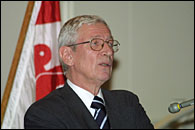Law and mafias
Few Canadians may recognize January 17 as a day to commemorate. But, as of 2002, this date is recognized as Raoul Wallenberg Day in Canada, in honour of the Swedish diplomat whose actions saved the lives of thousands of Jews in Hungary during the Second World War.
 Professor Göran Melander of Lund University, Sweden
Professor Göran Melander of Lund University, SwedenPHOTO: Owen Egan |
|
Wallenberg issued scores upon scores of fake Swedish passports to Jews in Budapest, which put them under the protection of the neutral government. He also persuaded Nazis to call off the destruction of Budapest's Jewish ghetto, preventing the loss of 50,000 lives. On January 17, 1945, Wallenberg was taken into "protective custody" by the Soviets and never seen again.
On the eve of Raoul Wallenberg Day this year, McGill's Faculty of Law, along with the Embassy of Sweden and InterAmicus, the Law School's International Human Rights Advocacy Centre, invited Professor Göran Melander of Sweden to lecture. Preceding the talk, the Canadian Ambassador to Sweden, Philippe Kirsch, was presented with the Canada-Sweden Human Rights Award for his role in helping to establish the International Criminal Court.
MP and law professor Irwin Cotler opened the evening urging us to remember that "one person can make a difference; one person can confront evil and prevail; one person can transform history."
Melander, a professor of international law at Lund University, is the founder and director of the Raoul Wallenberg Institute of Human Rights and Humanitarian Law. He chose a provocative title for his talk: "Human Rights Law, Humanitarian Law and Refugee Law: the Preoccupation of the Three Mafias."
It's not that he believes the three "mafias" are criminals, but that the laws are seen as three distinct families, when they interrelated and overlap. For example, the warring in former Yugoslavia had authorities asking if the situation was a violation of human rights law or humanitarian law. Not to mention that whichever it was, people were displaced, invoking refugee law. Keeping a hard distinction between the three families allows victims of violence to fall through the cracks.
International humanitarian law is called on to limit the effects of armed conflict between states and their methods of warfare, as well as to protect those who aren't participating in the hostilities.
Human rights law protects people at all times, in war or peace, domestically or internationally. The domain of humanitarian law often deals with fractured states. Without a single responsible governmental state, however, it's difficult to press for change through international sanctions or other means. The International Com-mittee of the Red Cross is one of the very few organizations that will step in to deliberate on behalf of suffering communities.
In refugee law, a state has to be responsible for persecution in order for a person to be considered a refugee. Nonetheless, because of the difficulty of determining whether a state is responsible or not for the actions leading to the displacement, some people are not completely covered by the laws. For instance, what if those responsible for displacing civilians are not a state, but a population within a state? Or if refugees want to return home from their country of asylum, but their country of origin no longer exists?
Although human rights law is on many international organizations' agendas, Melander noted that "the UN is a peace organization, and as such does not deal with humanitarian law." But he finds their lack of interest surprising and disheartening, and hopes they will "take the responsibility to develop and promote humanitarian law.
"I'm afraid to say a territorial thinking manages the international bodies," Melander says, pointing out that governmental and non-governmental organizations are not much better.
The International Criminal Court, Melander says, is one of the first instances in which human rights law and humanitarian law are brought together in an international forum. This effort helps to bridge the gaps some people fall through in seeking reparation.
"Humanitarian law can learn a lot from human rights law," he said. Whereas states that violate human rights are being internationally noted and condemned, as well as being sanctioned by the UN, Melander feels the Red Cross is the only currently effective monitor of humanitarian rights.
Non-governmental organizations (NGOs) also often focus on human rights, but are beginning to turn their efforts towards humanitarian conflicts, and are more likely to collaborate than governments who, as Melander puts it, "say that NGOs talk too much, for too long, and are too many." But Melander believes NGOs to be "extremely important in human rights law." For instance, the Landmine Convention is a direct result of NGO lobbying.
"I hope the mafias will not continue to draw strict lines," he said. "If each knows what the other is doing, it can lead to a better situation."

